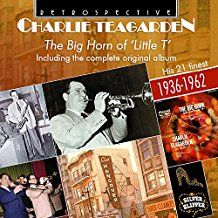 BUY NOW AmazonUK AmazonUS |
CHARLIE TEAGARDEN The Big Horn of ‘Little T’: His 21 finest, 1936-62 |
The Three Ts
‘s Wonderful
Liza
Jimmy Dorsey and his Orchestra
I Can’t Get Started
Jimmy Dorsey and his Original Dorseyland Jazz Band
Struttin’ with some Barbecue
Charley, My Boy (with Claire Hogan, vocal)
Jazz Me Blues
Basin Street Blues
The Club Hangover Trio
Sugar
Don’t Blame Me
Just You, Just Me
Bob Crosby and his All Stars
Ostrich Walk
Charlie Teagarden and his Group
What’s New?
Anything Goes
Gone with the Wind
I’m Getting Sentimental Over You
Yesterdays
Charmaine
You Stepped Out of a Dream
Tangerine
My Heart Belongs to Daddy
Thou Swell
Charlie Teagarden (1913-84) was seldom too far from his more famous brother Jack’s side. He played in the trombonist’s band a number of times but was more often found in the ranks of Jimmy Dorsey’s various outfits, though, like Jack, he enjoyed – or endured – a stay in Paul Whiteman’s outfit and played for Ben Pollack amongst a number of others ensembles. Charlie’s fine trumpet playing can be enjoyed during the course of these 21 tracks that span a quarter of a century. Valuably, the disc includes the complete ‘The Big Horn of Little T’ LP cut live in Las Vegas in March 1962.
Things start with performances from the end of 1936. The Three Ts (that’s to say, the two Teagardens and Frankie Trumbauer) was a sprightly little band with strong associations to Bix Beiderbecke via Min Leibrook, Trumbauer and Jack. On ‘S Wonderful everyone, except JT, sounds frantic, with playing seriously on the beat but the companion, Liza, is better if a bit swoony given the presence on harp of Adele Girard, usually an evocative instrumentalist but here sounding less effective. From then on things are post-war, so much so that the young Maynard Ferguson is in the trumpet section of Dorsey’s 1949 band where Charlie T takes the lead on I Can’t Get Started. No one can efface Bunny Berigan here but Charlie tries even to the extent of singing (a mistake). His trumpet playing is enriched by his strong, well utilised vibrato and an occasional phrasal trick of slip-sliding in his solos. Very effective.
Jimmy Dorsey’s Dorseyland band had its stylistic roots in Eddie Condon to a large extent – even Condon stalwarts like Cutty Cutshall and Dick Carey gravitated to Dorsey for these November 1949 sides. The arrangements are straight-down-the-line and so is the playing with Charlie setting a firm lead. It’s good that some transcriptions of this band have survived, and Basin Street Blues is one, a number immortalised by Jack T, but which features strong, gritty playing by Charlie. Some of the best playing in the disc is to be found in the live session at the Hangover Club in San Francisco, made in situ in September 1951. Better known for the Spanier-Hines live sessions, this trio of pieces by a trio of performers offers the best examples of Charlie’s playing, given the more extended playing time, live ambience and unshackled personnel. Jess Stacy plays piano on Sugar with Charlie and drummer Ray Baduc where Charlie solos with great lyricism and creatively unpredictable direction. On the other two tracks Stacy is replaced by the other great Teagarden, that impeccable piano stylist, Norma, whose romanticist instincts can be savoured on Don’t Blame Me. The up-tempo side of the sibling partnership comes in an exciting, rousing Just You, Just Me.
The Las Vegas album features Teagarden’s quartet playing ten standards. What’s New is ripely lyric, Gone with the Wind fast paced, living up to the title, as indeed is the unusually swift I’m Getting Sentimental Over You. Charlie plays some effective lower register work on Yesterdays where Ronnie Di Fillips’s good solo is endangered by the less-than-good state of his piano. Carson Smith plays with considerable nuance, taking a fine solo here and there. This album shows little diminution of Charlie’s talents, though his best playing remains the live session he made a decade before.
The tracks have been well selected and transferred, and enlisting Digby Fairweather to write the notes is always a wise move. This is a fine salute to an undervalued talent.
Jonathan Woolf